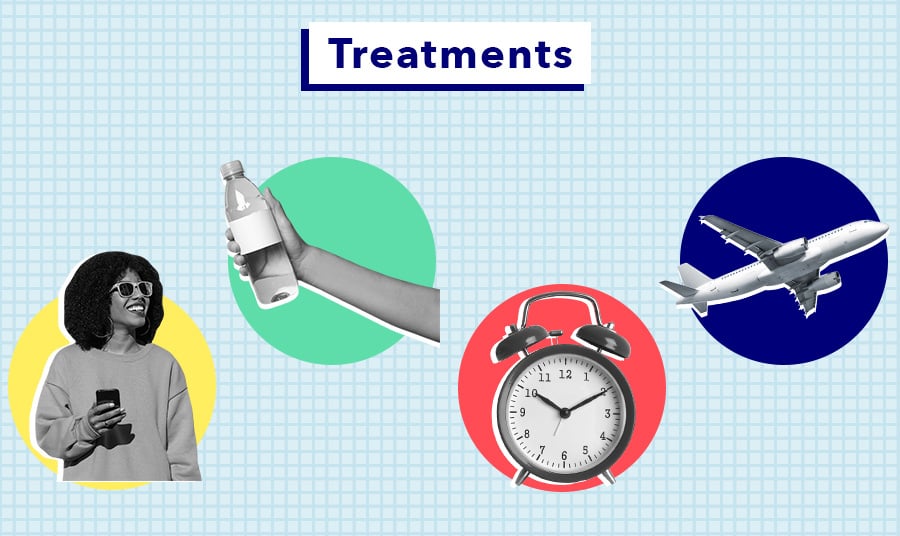Table of Contents
If you’ve ever traveled internationally, you’ve likely experienced jet lag, a temporary sleep disorder in which the body’s internal clock falls out of sync with its surroundings. It’s a disorienting sensation that can take several days to shake, especially if you don’t know how to treat it.
In this guide, you’ll get the full skinny on jet lag–from what it is, what its symptoms are, how to cure it, and much, much more. So, buckle up and get ready to take off into the dizzying world of jet lag.
What is Jet Lag?
Jet lag is a temporary sleep disorder that often occurs after traveling over several time zones in quick succession, according to the Mayo Clinic. The disorder can cause feelings of tiredness, nausea, confusion, and grogginess. Though the symptoms can be severe, they generally wear off after a few days, or at least until one’s internal clock gets realigned with its new surroundings. If you want to better understand jet lag, let’s start by taking a look at your circadian rhythm.
The Internal Clock
Every individual has their own internal clock, sometimes referred to as the “master clock,” which is powered by a group of approximately 20,000 nerve cells in the suprachiasmatic nucleus in the hypothalamus. These nerves use different external cues (like daylight and meal times) to send signals of alertness and sleepiness to the body. So, if you maintain a consistent routine from day to day, your body will get used to the schedule and establish a strict set of internal rhythms to support it.
Think of your master clock as a stern maestro. She’s carefully selected the members of her orchestra and learned how to conduct its moving parts to keep things running in perfect harmony. The ensemble practices every day, has their sheet music memorized, and understands how the music is meant to ebb and flow.
Now, imagine how the maestro might respond if you kept all the players the same, but gave them new instruments and sheet music. And then demanded that they perform a concert that very night. Chaos would likely ensue as the orchestra attempted to restore order to the well-oiled machine. There would need to be additional rehearsals to master the new movements. Undoubtedly, the players would groan and complain about the changes, until they, too, became second nature.

That’s basically what’s going on in your body when you travel far away from your home time zone. The interior mechanics get thrown way out of whack, leaving you feeling foggy and discombobulated.
If you’re a New Yorker visiting Tokyo, for example, your internal clock will still be using Eastern Standard Time cues when you first arrive, even though you’re quite literally 14 hours ahead in Japan Standard Time. That’s why you might feel sleepy while the folks around you are up and ready to start the day or why you might want to devour a four-course meal at two in the morning.
Thankfully, the effects wear off once your body has fully acclimated to the new time zone. For that reason, jet lag is categorized as a temporary sleep disorder, and a highly common one at that, with over 200,000 cases reported annually in the United States alone.
Jet Lag Symptoms
So, what exactly does jet lag feel like? As with any type of disordered sleeping, the symptoms can vary a lot depending on the individual, but according to the Centers for Disease Control and Prevention (CDC), some of the most common ones include:
- Disturbed sleep, mostly in the form of either insomnia or excessive sleepiness.
- Daytime fatigue, especially at times in which you’re normally energized or alert.
- Difficulty focusing or concentrating on the task at hand.
- Stomach issues, which could include constipation, diarrhea, or nausea.
- A general sense of huh? powered by fogginess and confusion.
- A gloomy disposition: headaches, anxiety, irritability, and depression could be heightened when you’re jet lagged.
- Being “off,” or just not feeling like yourself.

It’s worth noting that jet lag symptoms won’t always be so extreme, especially if you’re only traveling a few hours ahead or behind your normal zone. A general rule of thumb is that the farther ahead you go, the worse your symptoms will be. This is because you’ll be advancing your clock as opposed to delaying it, a phenomenon that also occurs when we “spring forward” during Daylight Savings Time.
Now the major symptoms have been covered, it’s time to get into a few treatments for jet lag.
How to Treat Jet Lag
Though there’s no way to fully cure jet lag (sorry!), there are a few tricks you can employ to soften its worst effects.
- Since the internal clock is influenced most heavily by the sun, it’s important to expose yourself to as much daylight as you can when you first arrive at your destination. It’s totally fine to take a quick cat nap after your flight, but it’s crucial to get up and move.
- You’ll also want to hydrate a ton on the plane ride over. While you might be tempted to grab a glass of wine to fuel some shut-eye in the sky, it’s actually much better to skip the alcohol all together and down copious amounts of H2O. Fatigue is directly tied to dehydration, so loading up on the watery good stuff will help you immensely once you land.

- Try to get into the rhythms of your new zone as quickly as possible. This may mean eating before you’re hungry or staying up late even if you’re exhausted. Though annoying in the short term, it’ll help a great deal in the long term.
- Try taking a melatonin supplement. Melatonin is a natural hormone your brain produces when it’s time to hit the hay, and a 2014 meta-analysis of eight different studies found that melatonin may help those with jet lag“re-balance” their sleep cycles quickly. It’s a safe treatment, but medical professionals suggest starting with a low dose first, and then take more if needed. Adults and children should take different doses, and it’s not recommended for women who are pregnant or nursing. You should consult your doctor before taking any medications to see if there could be any negative side effects for you or interactions with current medications.
- If you can, book an overnight flight that arrives in the morning. That way, you can sleep on the plane and start a new day as soon as you land. You’ll still feel some exhaustion, but you’ll be able to get into the swing of things much faster. Sleeping on a plane isn’t the easiest thing to do, but there are a few ways to make it more comfortable.
- Snag a travel pillow or sleep scarf to help support your head.
- Wear a comfortable eye mask to block any extra light from the plane or other passengers.
- Use noise canceling headphones, and listen to podcasts, meditations, or serene music that help you normally fall asleep.
- Use a travel blanket to keep your temperature regulated.
- Take a melatonin supplement if your healthcare provider says it’s okay.
Preventing Jet Lag Before You Travel
Sometimes the best offense is a good defense, right? If you don’t want to experience the full effects of jet lag, then it’s a good idea to focus on prevention before treatment. While you can’t completely dodge jet lag’s grip, there are some things you can do before you go to reduce the side effects, like:
- Getting lots of rest before your trip.
- Staying hydrated and cut down on the alcohol and caffeine.
- Getting to your destination a few days earlier than you need to if possible so you have time to adjust and before you leave
- Starting to slowly change your sleep schedule to the new time zone you’ll be in. Our handy Jet Lag Rooster will help you figure out when you need to start heading to bed and calculate the best sleep pattern for you before and during your travel.
Curious to know more about jet lag? Then take a look at some of the most commonly asked questions we get about it here at Sleepopolis.
Well, that’s all she wrote! For more travel tips and resources, make sure to check out our guide to the Best Travel Pillows as well as our tips for catching Zzz’s in the airport.
Jet Lag FAQs
Is it possible to prevent jet lag?
Sometimes the best offense is a good defense, right? If you don’t want to experience the full effects of jet lag, then it’s a good idea to focus on prevention before treatment. While you can’t completely dodge jet lag’s grip, there are some things you can do to reduce the side effects, like getting lots of rest before your trip, staying hydrated and cutting down on alcohol and caffeine, or slowly changing your sleep to the new time zone you’ll be in a few days before you go.
What is the feeling of jet lag?
You know it when you have it. It’s that groggy feeling after a bad night’s sleep–just escalated. Your body may feel heavy, the mind foggy, and you may be hungry at 3 a.m or have no interest in food. (Gives a whole new meaning to “dazed and confused.”) Essentially, you’ll just feel “off” and not as sharp as you normally would.
How do you get rid of jet lag fast?
The fastest way to get rid of jet lag is to acclimate to your new schedule as quickly as possible. This may mean fighting your body’s “natural” urges, such as eating when you aren’t hungry or going to sleep later than you might want to.
How long does it take to recover from jet lag?
The further away from your time zone you go, the longer it takes to recover. If you travel more than 12 hours ahead of your natural zone, for example, it could take as long as 4 to 5 days to recover.
Why is jet lag worse from east to west?
Traveling to the east can make jet lag more severe because it means your body’s moving “ahead” in time, which is generally more difficult than moving backwards. That’s why folks typically feel fine when coming back home after a long journey!
Subscribe Today!
Get the latest deals, discounts, reviews, and giveaways!
